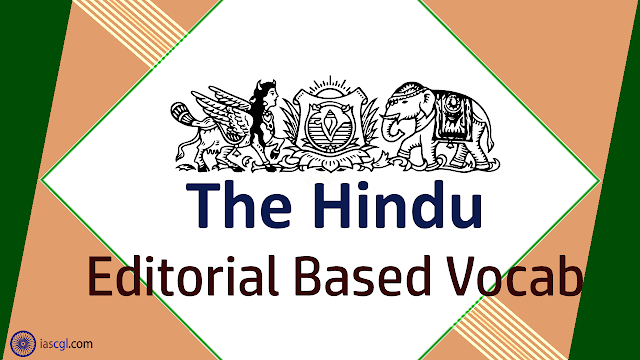Vocabulary from The Hindu Editorial 03rd September 2018 for Staff Selection Commission(SSC) Combined Graduate Level, Combined Higher Secondary Level, Bank PO, Clerk and other state Government Examination.

Jurisprudence of inverted commas
Biology does not trump human rights
Thulasi K. Raj’s article, “Ways to read the Constitution” (August 28), was erudite. In it, she elaborated the Canadian approaches to interpretation: namely, the original meaning of words used in the text of the Constitution and the ‘living tree’ or the purposive/contextualist approach.
These rival approaches are interesting, but I abstain from expressing any views on the matter as the apex court is now shortly to deliver its verdict in the Sabarimala case. However, the court has reiterated all too frequently that while overseas precedents are of some persuasive value, it will decide each matter within distinctively Indian contexts.
Article 17 of the Constitution outlaws the practice of “untouchability”. It is perhaps the only Constitution in the world that declares discrimination-based disability an offence. It certainly inaugurates a post-liberal conception of equality. The entire federal scheme is suspended by Article 35, which endows Parliament alone with the power, coupled with a duty, to make a law for constitutional offences (including rights under Articles 23 and 24 against exploitation).
Always ignored in the study of constitutional law is the salient fact that untouchability in the constitutional text, as well as the text of the Protection of Civil Rights Act, 1995, is placed within inverted commas.
The Constitution-makers used inverted commas compendiously to refer to ‘permanent’ and ‘temporary’ states of untouchability. The latter is incurred by a pious Hindu in many situations — for example, a full bath cures going to a funeral or touching a corpse, a proper puja and a dip in the Ganga cures going overseas or a contact with a foreigner. Menstruation cycles render a woman impure for three days. The Constitution forbids all states of “untouchability” and imposes a total prohibition on practising it.
It is a time-honoured principle of statutory interpretation and constitutional construction that when ‘a text is clear, it is compelling’. No scope arises here for preferring any further approach to interpretation because even freedom of religion is subject to “other provisions of this Part”, and Article 17 is clearly such a provision.
Practising “untouchability” cannot be a part of integrity of the practice of religion; in any case, the Constitution by the very first sentence of Article 17 forbids it. There is no way for the judges to say that the freedom of religion under Article 25 is not at all affected by the commandment of equality in Article 17.
Individuals’ social traits and gender are regarded by the Constitution as ‘accidents of birth’; no matter what religious cosmologies may want to say, biology does not trump human rights. Perhaps, alternate interpretative styles are more apt for other constitutional contentions.
- Erudite: वैज्ञानिक सोच - having or showing great knowledge or learning.
- Abstain: बचना - restrain oneself from doing or enjoying something.
- Reiterated: दोहराया - say something again or a number of times, typically for emphasis or clarity.
- Persuasive: प्रेरक - good at persuading someone to do or believe something through reasoning or the use of temptation.
- Precedents: उदाहरण - an earlier event or action that is regarded as an example or guide to be considered in subsequent similar circumstances.
- Distinctively: विशिष्ट - characteristic of one person or thing, and so serving to distinguish it from others.
- Endows: प्रदान करना - give or bequeath an income or property to (a person or institution).
- Compendiously: मुख़्तसर -containing or presenting the essential facts of something in a comprehensive but concise way.
- Pious: पवित्र - devoutly religious.
- Menstruation माहवारी- the process in a woman of discharging blood and other materials from the lining of the uterus at intervals of about one lunar month from puberty until menopause, except during pregnancy.
- Forbids: मना करना - refuse to allow (in this article, women are forbit to enter in temples)
- Commandment: आज्ञा - a divine rule, especially one of the Ten Commandments.
- Cosmologies: ब्रह्माण्ड विज्ञान - the science of the origin and development of the universe. Modern astronomy is dominated by the Big Bang theory, which brings together observational astronomy and particle physics.

0Comments